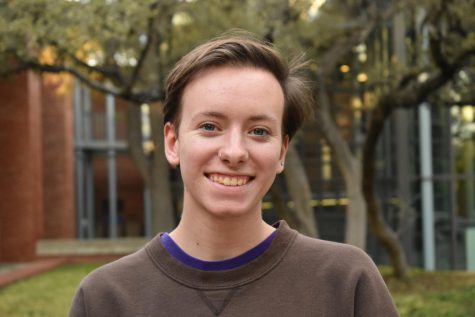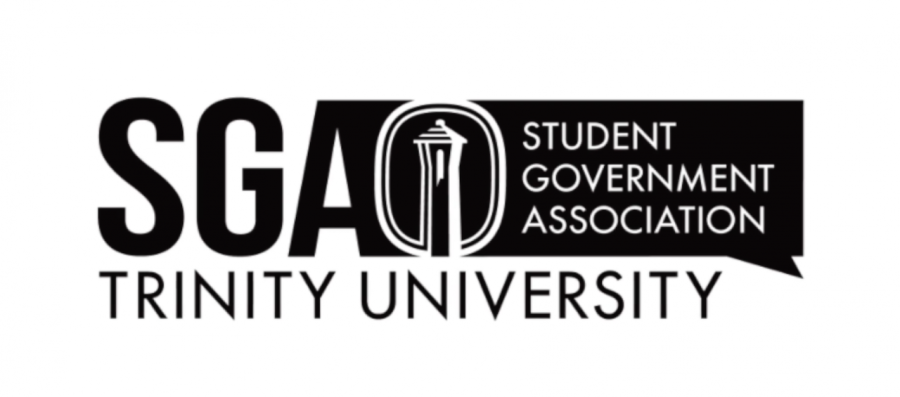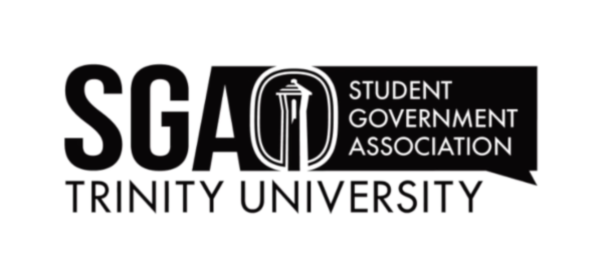Previously, on SGA: Divest Trinity resolution adopted
Climate Check
First-year Ani Siva began Climate Check with a concern brought forth by Miller and Calvert residents about students destroying exit signs in their residence halls. A Residential Life Coordinator (RLC) emailed all residents saying that if the destruction continues, the cost of replacements would be spread across all Miller and Calvert residents. President Oliver Chapin-Eiserloh advised Siva to reach out to Director of Residential Life Bret Biance or Adviser Demi Brown, Dean of Students, if there are concerns about an RLC attempting to have all residents charged.
Junior Senator Indigo Pearson spoke for the residents of Thomas, saying there is a general understanding that the rat problem stemmed from someone’s pet rat going loose on the third floor.
Senator Pearson also said there are current sophomores who have not gotten housing assignments confirmed for next year yet. The students he spoke with are now applying to live off-campus. First-year Senator Harrison Tinker reminded Pearson that Residential Life is still working on arranging housing assignments, with more information to come for those still waiting. President Chapin-Eiserloh seconded this and said that there are almost always some waitlists for housing as transfer students and students studying abroad release themselves from their assignments.
Senator Tinker turned to residential hall cleaning and spoke for McLean residents’ concerns that some dorm rooms are not getting cleaned thoroughly. He heard from multiple students whose rooms were either skipped entirely on their scheduled cleaning day or who only had their bathroom cleaned. Tinker has been in contact with Ernesto Gonzalez to remediate the problem, but students remain angry. Chief of Staff Lisel Faust said that cleaning the floors of the rest of the dorm room is not in the contract for cleaners, so they are only cleaning bathrooms because they are short-staffed.
Tinker recognized that while it may not be required to clean the full room, Trinity advertises that dorm rooms receive cleaning both in the bathroom and bedroom. Even one email from Residential Life clarifying what residents should expect, he said, would be helpful. Adviser Brown said he will reach out to Facilities Services to establish and communicate cleaning parameters.
First-year Senator Ella Charbonnet spoke with a student with an allergy to soy who cannot eat at Mabee Dining Hall because of the allergy risk. She said she was denied a dorm with a kitchen this year and next year so that she could make her own food. Chief of Staff Faust said a doctor’s documentation is necessary so that Student Accessibility Services (SAS) can give accommodations. President Chapin-Eiserloh advised Charbonnet to follow up with Adviser Brown if this student had filed with SAS and still was denied. Adviser Brown mentioned that there has been a large increase in students requesting accommodations with SAS, so working with Spencer Scruggs, Director of Student Accessibility Services, is crucial in receiving documentation for accommodations.
Sophomore Senator Jack Maxwell also spoke to someone attempting to get an extension for off-campus living whose doctor’s note was rejected by SAS. Adviser Brown said that for SAS to approve an accommodation, a doctor needs to provide specific reasons for why and how said accommodation is necessary for the student. In this case, the student’s doctor’s note may not have had enough information to make an accommodation decision.
Next, Senator Charbonnet mentioned that the ice cream machine in Mabee is still heating up instead of cooling.
Funding
Senior Calena Kovar presented a funding request on behalf of Hillel. The organization hosted a Passover seder for 34 people, sharing traditional food and sending participants off with leftovers since Passover continued afterward. Chapel and Spiritual Life helped front the bill, Kovar said, but they still needed $1,554. The Senate unanimously approved the full amount.
Senior Grant Kinscherff, captain of the Trinity Rugby team, presented a funding request that would help pay for Rugby’s travel to Atlanta for the national championships. The Rugby team has almost $5,000 raised on GoFundMe, and they have done other fundraising activities like raffles. Student Activity Fee (SAF) money would pay for the rest, including flights for 14 people, an AirBnb and a rental van. The Senate approved the full amount of $8,572 with the knowledge that any money not used would go back to Trinity.
Senior Adam Rinaldi, SGA Treasurer, presented on behalf of the Commencement and Convocation Committee. Since Alamo Stadium will be off-limits for Trinity parking during Commencement, the committee is looking to incentivize carpooling to campus by offering 150 Uber vouchers. Each person who receives them on a first-come-first-serve basis would get two $10 vouchers with Trinity set as the destination and a time limit for families to ride to and from campus. The Senate approved the full amount of $3,075.
Eco Allies present Divest Trinity resolution
Before Eco Allies presented their resolution, President Chapin-Eiserloh reminded SGA of the process for resolutions. Resolutions are non-binding documents that do not lead to specific change; the Senate may formally endorse ideas or actions through resolutions. They are sponsored by a senator who approves or rejects any changes motioned by the Senate. Eco Allies’ resolution is sponsored by Senior Senator Sam Grimsley.
Junior Kenny Nelson and senior Ethan Crane presented the cause for the resolution that calls for Trinity’s endowment to divest from fossil fuels. Crane began with the moral side of the argument, bringing up the most recent Intergovernmental Panel on Climate Change report that urged immediate action to prevent the unalterable, catastrophic consequences of climate change. These include mass displacement, forest fires, sea-level rise and malnourishment, Crane said. The Divest Trinity resolution is an attempt to move away from this future by divesting from fossil fuels, and Crane, Nelson and the multiple rows of students lining the back of the Waxahachie room called on SGA to stand with them in this effort. According to Crane, Trinity has the ability to signal that the fossil fuel industry does not have a legitimate or promising future, so it is necessary to reduce its ability to continue succeeding financially.
Nelson presented the economic reasoning for divestment, saying that investments in ESG (environmental social governance) funds outperform those in fossil fuels. Meanwhile, fossil fuels are a bomb waiting to go off, Nelson said, and the faster Trinity pulls money from the industry, the better they will preserve their economic health. Crane and Nelson mentioned that other universities have had issues divesting because of financial conflicts of interest, so they are hoping that the Trinity Board of Trustees — who would ultimately make the decision to divest or not — could look above any conflicts of interest they have.
After the brief presentation, the floor was opened to senators for questions. Senator Maxwell firstly asked if Eco Allies knew of any slight divestment from the endowment in recent years. Nelson said the Board of Trustees is not very transparent, so Eco Allies cannot quantify what the current investment is in fossil fuels. The closest estimate is from last year’s financial statements, putting mineral holdings at around $91 million. This includes fossil fuels.
Nelson fielded multiple questions about the timeframe and process for divestment. If the Board of Trustees were to choose to divest, it would be a two-part process. First, the university would conduct an audit of its current holdings and divest from those assets outright. However, since Trinity also invests in fossil fuels indirectly through commingled funds — including hedge funds — there would be a separate audit of those investments. This analysis would take place over five years as a prerequisite to divestment.
Sophomore Senator Danny Nguyen applauded Eco Allies’ efforts in rallying support for Divest Trinity, gesturing to the back of the room where students sat in support of the resolution. He then asked how Eco Allies would respond to what they think is the biggest argument in opposition to divestment. Nelson thought the biggest argument against their movement is that divestment would undermine the financial health of Trinity’s endowment. However, he said he would respond with economic information that shows how fossil fuel assets are increasingly less beneficial as public support for the industry wanes.
Senator Charbonnet asked what kind of renewable resources Trinity would invest in after divesting from fossil fuels. Nelson suggested ESG and mutual funds; having a diverse array of renewables would benefit Trinity the most, he said, because if one performs poorly there will be others to lean on. Communications Chair Rebecca Wicker then questioned why the focus should be on fossil fuels alone for ethical reasons when other endowment investments could be considered unethical as well. For Crane, fossil fuels are particularly dangerous, and since they already have a movement surrounding them, divestment from them specifically would be easier to ask for. Nelson added that ESG funds take ethical dilemmas into account and would not invest in renewables derived from these concerns.
Finally, the Senate asked Crane and Nelson what the next steps would be for Divest Trinity if they adopted the resolution. Crane said they have concrete plans for students to continue making the case for divestment in media and actions such as public protest and collaboration with various Registered Student Organizations (RSOs). They have not been in contact with the Board of Trustees thus far.
After some discussion about the conditions of the resolution, a few changes were made upon Senator Grimsley’s approval; these included minor word changes, as well as a full-sentence regarding the Board of Trustees’ conflicts of interest being removed.
Just before quorum was lost in the Senate, the resolution was put to a vote. With one senator opposed and one abstaining, SGA adopted the resolution “Recommending the Board of Trustees Divest the Endowment from Fossil Fuels.”

I am a senior French and Earth Systems Science double major from St. Louis, MO. When I'm not wearing my EIC hat, I am also a Chapel | Spiritual Life Fellow,...








Ethan Crane • Apr 29, 2022 at 11:47 am
The Resolution is attached here: https://docs.google.com/document/d/13lkKdQ3rQXJFYKFC-NxqQG5zv2z7Wa3OOX3lh2W1soI/edit?usp=sharing